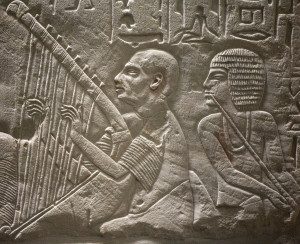 The Ancient Egyptians have something of a reputation when it comes to death: morbidly obsessed, in a nutshell. Gloomy, fearful. But that is looking at the matter backwards – it would be more accurate to say they were obsessed with life. The savings poured into preparations for burial and the afterlife were more like pension plans, designed to maintain an acceptable standard of postmortem living. But even so, a song from the Middle Kingdom, preserved in New Kingdom copies from hundreds of years later, sounds a rare note more celebratory of life above-ground, and the joys of the here and now:
The Ancient Egyptians have something of a reputation when it comes to death: morbidly obsessed, in a nutshell. Gloomy, fearful. But that is looking at the matter backwards – it would be more accurate to say they were obsessed with life. The savings poured into preparations for burial and the afterlife were more like pension plans, designed to maintain an acceptable standard of postmortem living. But even so, a song from the Middle Kingdom, preserved in New Kingdom copies from hundreds of years later, sounds a rare note more celebratory of life above-ground, and the joys of the here and now:
The Song from the Tomb of King Intef
Death is a kindly fate.
A Generation passes,
Another stays,
Since the time of the ancestors.
The gods who were before rest in their tombs,
Blessed nobles too are buried in their tombs.
(Yet) those who built tombs,
Their places are gone,
What has become of them?
I have heard the words of Imhotep and Hardedef,
Whose sayings are recited in whole.
What of their places?
Their walls have crumbled,
Their places are gone,
As though they had never been!
None comes from there,
To tell of their state,
To tell of their needs,
To calm our hearts,
Until we go where they have gone!
Hence rejoice in your heart!
Forgetfulness profits you,
Follow your heart as long as you live!
Put myrrh on your head,
Dress in fine linen,
Anoint yourself with oils fit for a god,
Heap up your joys,
Let your heart not sink!
Follow your heart and your happiness,
Do your things on earth as your heart commands!
When there comes to you that day of mourning,
The Weary-hearted (Osiris) hears not their mourning,
Wailing saves no man from the pit!
Refrain: Make holiday,
Do not weary of it!
Lo, none is allowed to take his goods with him,
Lo, none who departs comes back again!
Translation by Miriam Lichtheim, Ancient Egyptian Literature, Volume 1: The Old and Middle Kingdoms (1973), pp 194-7.
